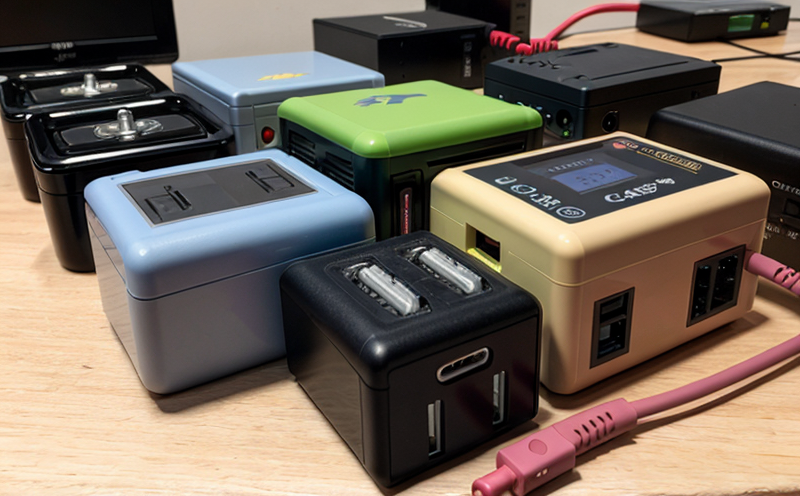Dielectric Strength Testing of Battery Chargers
The dielectric strength testing of battery chargers is a critical process that ensures the safety and reliability of electrical devices. This test evaluates the insulation material's ability to withstand high voltage without breaking down or causing a short circuit. In consumer products, particularly those involving batteries like cell phones, laptops, and electric vehicles, this test is essential for compliance with international standards such as IEC 62139 and UL 248-1.
During dielectric strength testing, the charger's internal components are subjected to a high voltage stress. This process helps identify potential weaknesses in insulation that could lead to dangerous electrical faults or fires. The test aims to simulate real-world conditions where the device might be exposed to over-voltages, ensuring it remains safe and functional under extreme circumstances.
The importance of this testing cannot be overstated, especially given the increasing number of portable electronics and the associated risks they pose if not properly regulated. By conducting rigorous dielectric strength tests early in the development cycle, manufacturers can catch design flaws before products reach consumers. This proactive approach helps prevent recalls and enhances brand reputation.
For quality managers and compliance officers, understanding the nuances of this test is crucial. It requires precise calibration of equipment to ensure accurate results. Additionally, selecting appropriate sample sizes and preparation methods directly impacts the outcome of these tests. Proper documentation of test procedures and findings also plays a vital role in meeting regulatory requirements.
From an R&D perspective, dielectric strength testing provides valuable insights into material properties that can inform future product designs. Engineers can use this data to optimize insulation layers and improve overall performance while maintaining safety standards. In procurement, ensuring suppliers adhere to these stringent tests ensures consistent quality across all products.
Why Choose This Test
Dielectric strength testing offers several advantages for manufacturers and designers of battery chargers:
- Achieves Compliance with Standards: Ensures adherence to international regulations such as IEC 62139, which sets stringent requirements for safety in portable electronics.
- Enhances Product Safety: Identifies potential hazards early in the development process, reducing risks associated with electrical faults or fires.
- Improves Reliability: By identifying weak points in insulation materials, manufacturers can enhance product durability and performance.
- Supports Brand Reputation: Demonstrating commitment to safety through rigorous testing enhances consumer trust and satisfaction.
- Facilitates Regulatory Approval: Meeting strict test criteria expedites the approval process for new products entering the market.
In summary, dielectric strength testing is not just a compliance requirement but a strategic investment in product quality and consumer safety. It provides manufacturers with the confidence needed to bring reliable products to market while minimizing potential liabilities.
Competitive Advantage and Market Impact
The ability to perform accurate dielectric strength testing offers significant competitive advantages:
- Enhanced Product Safety: Demonstrating a commitment to safety can set your products apart from competitors, leading to higher market share.
- Improved Brand Reputation: Consistently meeting or exceeding regulatory standards boosts brand image and customer loyalty.
- Faster Market Entry: By ensuring compliance with all relevant regulations upfront, you can expedite the approval process for new products.
- Increased Customer Trust: Consumers increasingly demand proof of safety from manufacturers. Providing this through comprehensive testing builds trust and confidence.
In today's competitive market, where product reliability is paramount, dielectric strength testing becomes more than just a requirement; it transforms into a strategic asset that can drive business growth.
Use Cases and Application Examples
The application of dielectric strength testing extends beyond mere compliance. Here are some real-world use cases:
- Portable Electronics: Ensuring that chargers for smartphones, tablets, and other portable devices can withstand high voltages without failing.
- E-Scooters and E-Bikes: Evaluating the insulation integrity of batteries in these increasingly popular mobility solutions to prevent short circuits or fires.
- Smart Appliances: Testing chargers for smart home devices to guarantee they meet stringent safety standards before release into the market.
- Automotive Accessories: Conducting tests on car chargers and jump starters to ensure they remain safe even in high-voltage environments.
In each of these scenarios, dielectric strength testing serves as a crucial step in ensuring product safety and reliability. By incorporating this test into the manufacturing process, companies can enhance their competitive edge and contribute positively to public safety.





